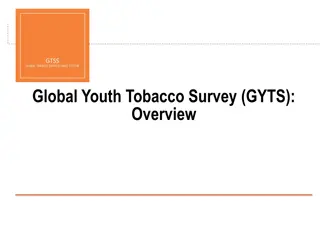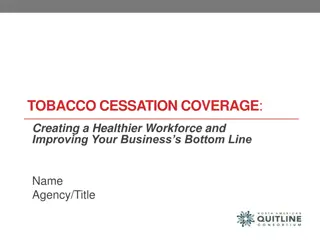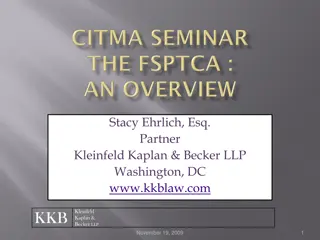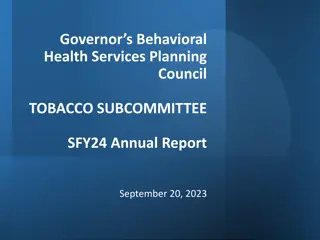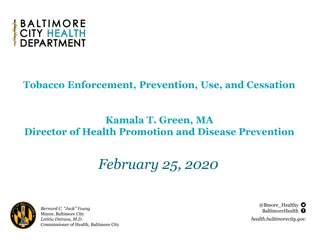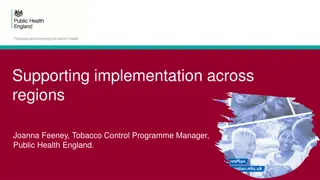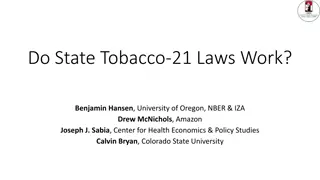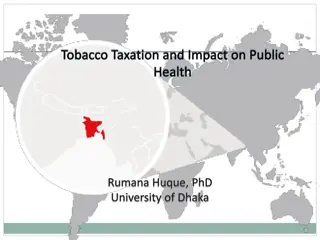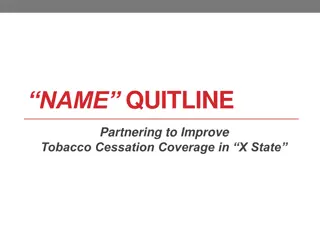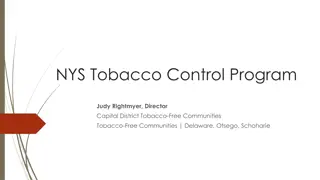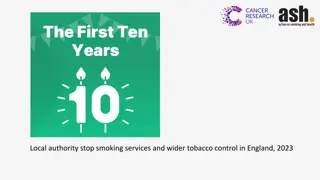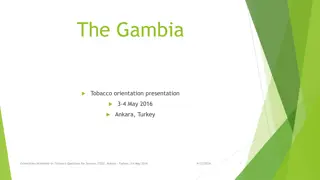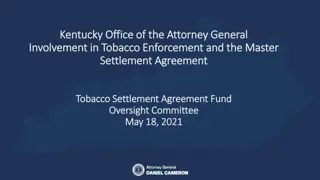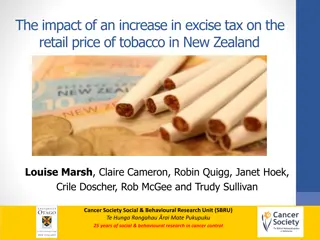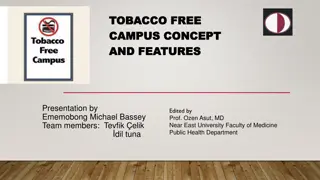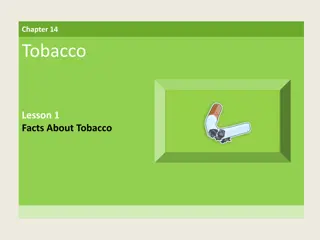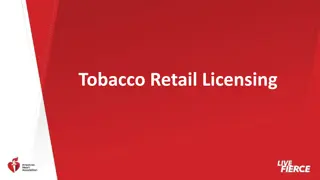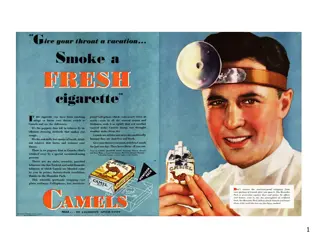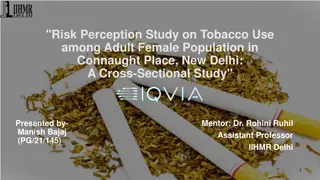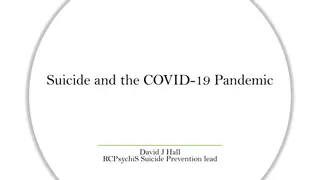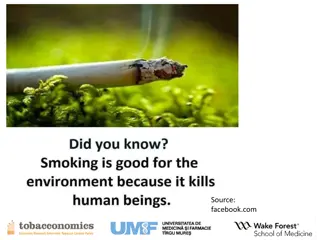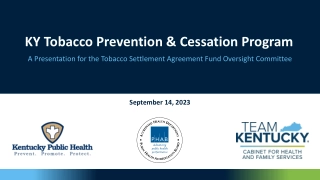Transforming Tobacco Control Strategies During the COVID-19 Pandemic
The report presented by ASH and commissioned by Cancer Research UK highlights how local authorities in England adapted their tobacco control strategies amidst the challenges posed by the COVID-19 pandemic. By quickly transitioning to remote delivery of stop smoking services, creating alternative referral pathways, maintaining provision of nicotine replacement therapy, and leveraging public communications, local authorities turned pandemic challenges into opportunities to enhance tobacco control efforts.
Download Presentation

Please find below an Image/Link to download the presentation.
The content on the website is provided AS IS for your information and personal use only. It may not be sold, licensed, or shared on other websites without obtaining consent from the author. Download presentation by click this link. If you encounter any issues during the download, it is possible that the publisher has removed the file from their server.
E N D
Presentation Transcript
For further information and resources, please open the notes section of these slides The full report can be accessed here: https://ash.org.uk/information-and- resources/reports-submissions/reports/steppingup/ If you have any questions, please get in touch by emailing admin@smokefreeaction.org.uk
Background Background The report, written by ASH and commissioned by Cancer Research UK, presented findings from the 7th annual survey of tobacco control leads in English local authorities. It heard from 106 individuals covering 111 (74%) of the 154 local authorities in England with responsibility for public health. This was a comparable response rate to that of previous years (84% in 2019, 71% in 2018). The survey asked about the impact of lockdown restrictions and the wider pandemic on the delivery of local authority stop smoking services and wider tobacco control activity.
Local authorities transformed challenges of the pandemic into opportunities How the challenges of COVID-19 were transformed into opportunities The Challenges of COVID-19 Transformed into Opportunities Quickly transitioning to remote delivery of stop smoking services. Remote services created - described by clients as more flexible, accessible, informal, speedy, and practical. Handling reduced referrals to and extra demand on local authority services following difficulties faced by NHS. Alternative referral pathways rapidly created and local authority stop smoking services able to meet extra demand. Maintaining provision of nicotine replacement therapy, other medications and e-cigarettes to clients in lockdown. New delivery methods identified: emailing vouchers and letters to pharmacists and GPs, posting and delivering products to clients and using online pharmacies. Maintaining delivery of advice and medication to vulnerable clients most impacted by COVID-19. Remote methods exploited mechanisms created by local authorities to reach people most affected by COVID-19. Maintaining and adapting public communication encouraging smokers to quit and use stop smoking services. Local authorities took advantage of the #QuitforCovid campaign and resources to expand communications. Mitigating adverse effects of COVID-19 on tobacco control alliances due to cancelled meetings and loss of capacity. Tobacco control alliances built valuable new relationships with stakeholders within and beyond their local authority.
What were the key takeaways? What were the key takeaways? 1. Service models rapidly adapted to the impact of COVID-19. 2. Services with diverse referral pathways fared best filling gaps in NHS provision due to COVID-19 3. Local authorities maintained comprehensive tobacco control 4. Stepped up communications activity
1. Service Models 1. Service Models Methods used by stop smoking services to provide advice: commissioned for 2020/21, used during lockdown, and used at the time of the survey The biggest shift was the transition to remote service models 110 out of 111 local authorities abandoned face- to-face support following the March lockdown. By September only 18% of local authorities offered face-to-face support. There was however considerable variation in the specific remote services offered by different local authorities, shown in Figure 1.
1. Service Models 1. Service Models Survey respondents praised the advantages of remote service delivery but also identified limitations, shown below. The advantages and disadvantages of remote service provision
1. Service Models 1. Service Models Whilst remote support for smoking cessation was a necessary and welcome innovation that has brought benefits with it, the limitations also demonstrate that remote support alone does not appear to be sufficient in meeting the needs of the whole population of smokers. Recommendation Local authorities should consider how lessons from the innovation this year can be best applied in the future to meet the needs of all smokers in the most effective way. Remote support may need to be complemented by face-to-face services for populations that are unable or unwilling to access remote support. It is likely that many services will continue to be remote through 2021; this provides an opportunity to evaluate these methods before determining the profile of longer-term service models that meet the needs of all smokers.
2. NHS collaboration 2. NHS collaboration What respondents told us Although survey respondents weren t specifically asked about changes in NHS capacity and referrals, a decline in capacity in primary or secondary care, or a decline in referrals, was reported in free-text answers by two thirds (67%) of surveyed local authorities. NHS providers were and have been under intense pressure, reducing their capacity to address smoking. Stop smoking services that had diverse referral pathways, especially opportunities for self-referral, fared better than services which were more reliant on client referrals from NHS services and staff. Recommendation As pressure on the NHS eases, local authorities should explore ways to strengthen links with NHS partners, ensuring that primary care referral pathways that have been interrupted during COVID-19 are restored. The roll-out of the NHS Long Term Plan in 2021 will create new opportunities to address tobacco dependence in acute, mental health and maternity settings.
3. Comprehensive tobacco control activity 3. Comprehensive tobacco control activity Local authorities maintained a wide range of tobacco control work after the March 2020 lockdown, but with considerable variety in how much tobacco control activity was offered. Six local authorities reported doing all of the activities here, whilst six reported doing none. Wider tobacco control work undertaken by surveyed local authorities Tobacco Control Activity Local Authorities (n=108) Tackling illegal tobacco 93 (86%) Enforcing legislation 88 (81%) The presence of tobacco control alliances was crucial. Local authorities with strategic, well-led, accountable, well-resourced, and well-connected tobacco control partnerships better maintained comprehensive tobacco control activity. Communications and campaigns 78 (72%) Smokefree public spaces 68 (63%) and delivered Smokefree homes 48 (44%) Three fifths (61%) of local authorities had a tobacco control alliance or partnership at the time of survey. Whilst some tobacco control alliances were well maintained and even reinvigorated during the pandemic, over two-thirds of local authorities with alliances reduced alliance activity. Regional support/action 48 (44%) Research 12 (11%) None of the above 6 (6%)
3. Comprehensive tobacco control activity 3. Comprehensive tobacco control activity Reaching Vulnerable Groups Local authorities exploited new pathways created by COVID-19 response services targeting vulnerable groups to reach higher numbers of vulnerable smokers, given crossover between groups vulnerable to COVID-19 and vulnerable smokers (homeless people, those with adverse mental health, substance misusers, etc.). In three fifths of surveyed local authorities (59%), stop smoking services made special provisions for vulnerable groups in response to COVID-19. Measures included: Asking NHS partners to identify vulnerable individuals among their smokers Partnerships with homeless charities Placing a sticker on all food deliveries and government deliveries to those vulnerable to COVID-19 Set up of county Welfare service to refer vulnerable people in lockdown to appropriate stop smoking services Recommendation COVID-19 s impact on comprehensive tobacco control activity was varied but undeniably disruptive. It is important for local authorities to ensure comprehensive tobacco control strategies which take account of the pandemic s lessons are in place. Comprehensive tobacco control activity should also be a core part of any council-led COVID-19 recovery plans, given the contribution smoking makes to health and economic inequalities.
4. Communications 4. Communications Local authorities took advantage of the impetus created by COVID-19 for health improvement by delivering local communications campaigns, with support from the successful national #QuitforCovid campaign, which encouraged people to quit smoking. Overall, 98% of surveyed local authorities had delivered some communications on smoking in the previous 12 months. Table 3. Public Communication Methods used by Local Authorities Only half (48%) [of LAs] had a strategy in place to communicate with their whole population of smokers at the time of the survey. Public Communication Method Local Authorities (n=111) Social Media Promotion 102 (92%) Promotion on websites 96 (86%) Council newsletters 80 (72%) Recommendation Posters/leaflets 80 (72%) Local authorities should develop and implement communications strategies which take advantage of revitalised relationships with local stakeholders and build on their communications successes from 2020. Social marketing activity is most effective at regional level and opportunities to collaborate on a larger footprint should be sought and grasped. Local press releases 74 (67%) Text messages to identified smokers 66 (59%) Digital advertising 42 (38%) Radio advertising 25 (23%) Print/newspaper advertising 18 (16%) Email to identified smokers 18 (16%) TV advertising 10 (9%) None of the above 2 (2%)
Conclusions Conclusions Planning for COVID Planning for COVID- -19 Recovery 19 Recovery Local authorities deserve great credit for a resilient, adept, and innovative response to the challenges of COVID-19. As we plan for COVID-19 recovery, there are several important next steps vital with the next Tobacco Control Plan expected in July 2021. What you can do What ASH will do Evaluate remote methods before determining longer-term service models. Consider how to deliver for populations unable or unwilling to access remote support. Service models Keep you informed about the progress of the next Tobacco Control Plan for England and work nationally to inform content Maintain webinar series and connect you with latest evidence through regular email updates Continue to work with NHSE nationally and maintain Smoking in Pregnancy and Mental Health and smoking networks Provide communication resources to support local work like those on the SFAC site Boost links with NHS partners to address any referral pathways disrupted by COVID-19 particularly in primary care. Seize opportunities of NHS Long Term Plan roll-out on smoking to establish closer collaboration. NHS collaboration Comprehensive tobacco control Ensure that comprehensive tobacco control strategies are in place. Make comprehensive tobacco control activity a core part of COVID-19 recovery plans, reflecting the impact both health and wealth. Develop and enact comms strategies building on relationships with local stakeholders and comms successes from 2020. Where possible identify opportunities to collaborate on communications at regional level shown to be best value. Comms
For further information and resources, please open the notes section of these slides The full report can be accessed here: https://ash.org.uk/information-and- resources/reports-submissions/reports/steppingup/ If you have any questions, please get in touch by emailing admin@smokefreeaction.org.uk


